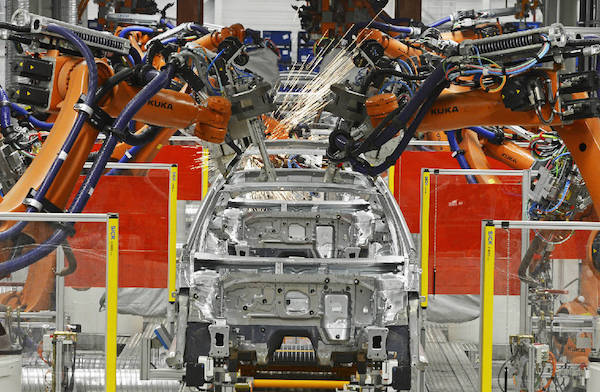Recent reports give a near-term picture of how experts believe the automation revolution will roll out. Continuing education to adapt to technology will become more necessary as some careers will “cease to exist.”
There is a minor industry of reassurance — writers who spread the message that the automation revolution is over-hyped and will not create widespread unemployment. A news search for automation + jobs will routinely bring up 20 percent or more of don’t-worry items. One example is a New York Times October 7 opinion piece No, That Robot Will Not Steal Your Job that chirps, “There are jobs, jobs everywhere.”
Yes, the economy is booming now, which has been aided enormously by having a business-friendly president in the White House. The problem lies a few years down the road where the machines and software have become cheaper, and it makes sense for owners to replace workers.
“The displacement is already beginning to happen,” according to Jeff Hesse, principal of PwC, which published “Workforce of the Future” in September. He continued, ”It varies a bit by industry, but over the next five years we’re going to see the need for workers to change their skills at an accelerating pace.”

Okay, it’s a prediction, and not all predictions play out as written. But you would think that the potential of significant job loss from automation in the semi-near future would get a little attention in Washington, and it hasn’t.
There are strategies to cope with the revolutionary changes coming to the workplace, such as an increased emphasis on technical training to prepare workers for future jobs.
Certainly it makes sense for America to chill seriously on immigration if a PwC projection noted below is correct that “38 percent of U.S. jobs are at risk of being affected by automation by the early 2030s.” It is crazy to continue importing foreign workers when the need for them is Zero in the near future.
The Reports Are In: AI and Robots Will Significantly Threaten Jobs in 5 Years, Futurism.com, October 8, 2017
IN BRIEF
A report suggests people only have five years before automation and AI threaten jobs and force them to learn new skills for the workforce. The firm PwC surveyed 10,000 people from around the world, revealing people are concerned about automation, but they’re also willing to learn.THE ROBOTS ARE COMING TO THREATEN JOBS
A study from Redwood Software and Sapio Research released October 4th revealed that IT leaders believe automation could impact 60% of businesses by 2022 and threaten jobs in the process. Now, a new, separate report from PwC, the second biggest professional services firm worldwide, suggests a similar timeline; one in which people may need to practice and learn new skills — or be left behind as automation takes over.
The report, titled Workforce of the Future, surveyed 10,000 people across China, India, Germany, the UK, and the U.S. to “better understand the future of work.” Of those, nearly 37% think artificial intelligence and robotics will put their jobs at risk; in 2014, 33% had a similar concern. . .
As of March 2017, PwC reports about 38% of U.S. jobs are at risk of being affected by automation by the early 2030s, with Germany closely behind at 35%; the UK at 30%; and Japan at 21%.
REQUIRED SKILLS AND ALTERNATIVE INCOMES
Last year, Microsoft co-founder and philanthropist Bill Gates said there were three skills people would need to survive in a job market that continues to embrace technology: science, engineering and economics. They don’t need to be experts, but they need to understand what people in each field are capable of. In the case of robotics, those with knowledge about managing automatic software programs will be highly sought after. Hesse also suggests people research which skills their fields will be in need of.
You can’t talk about the rise of robotics and automation without asking about those unable to adjust or unwilling to learn a new skill. 56% of the people PwC surveyed think governments should take any steps necessary to protect jobs, presumably so people without technical prowess can continue to work and earn an income.
(Continues)


